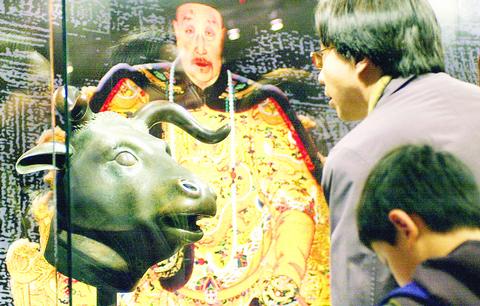A collection of Chinese antiques, including three 18th-century bronze sculptures looted from China by British and French troops some 140 years ago, went on display in Taipei yesterday.
The exhibition -- the first of its kind ever held outside China -- was organized by an art museum belonging to a Chinese conglomerate to promote cultural exchanges, said Chen Hongsheng, the museum's vice president.

PHOTO: AP
At the exhibition hall, bronze sculptures of tiger, monkey and ox heads were displayed in a glass cabinet next to a painting of the opulent gardens of Yuan Ming Yuan (
In 1860, during the second Opium War, British and French troops occupied the area, looted its treasures and set fire to the palaces.
The bronze heads were part of a water clock featuring the 12 animals of the Chinese zodiac. The China Poly Group (保利博物館), a state-owned conglomerate, bought them for about US$4 million from auctions held by Sotheby's and Christie's in Hong Kong last year.
Chen said Chinese officials also hope to recover another four of the 12 animals originally belonging to the water clock: a horse head said to be in Taiwan; a boar's head said to be in the US and the heads of a rat and a rabbit held by a French collector.
The whereabouts of the others is unknown, he said.
Following the exhibition here, which is to last three months, the sculptures, together with bronze utensils and stone Buddha statues, will be displayed in Japan, France and Greece next year, he said.

‘ABUSE OF POWER’: Lee Chun-yi allegedly used a Control Yuan vehicle to transport his dog to a pet grooming salon and take his wife to restaurants, media reports said Control Yuan Secretary-General Lee Chun-yi (李俊俋) resigned on Sunday night, admitting that he had misused a government vehicle, as reported by the media. Control Yuan Vice President Lee Hung-chun (李鴻鈞) yesterday apologized to the public over the issue. The watchdog body would follow up on similar accusations made by the Chinese Nationalist Party (KMT) and would investigate the alleged misuse of government vehicles by three other Control Yuan members: Su Li-chiung (蘇麗瓊), Lin Yu-jung (林郁容) and Wang Jung-chang (王榮璋), Lee Hung-chun said. Lee Chun-yi in a statement apologized for using a Control Yuan vehicle to transport his dog to a

BEIJING’S ‘PAWN’: ‘We, as Chinese, should never forget our roots, history, culture,’ Want Want Holdings general manager Tsai Wang-ting said at a summit in China The Mainland Affairs Council (MAC) yesterday condemned Want Want China Times Media Group (旺旺中時媒體集團) for making comments at the Cross-Strait Chinese Culture Summit that it said have damaged Taiwan’s sovereignty, adding that it would investigate if the group had colluded with China in the matter and contravened cross-strait regulations. The council issued a statement after Want Want Holdings (旺旺集團有限公司) general manager Tsai Wang-ting (蔡旺庭), the third son of the group’s founder, Tsai Eng-meng (蔡衍明), said at the summit last week that the group originated in “Chinese Taiwan,” and has developed and prospered in “the motherland.” “We, as Chinese, should never

‘A SURVIVAL QUESTION’: US officials have been urging the opposition KMT and TPP not to block defense spending, especially the special defense budget, an official said The US plans to ramp up weapons sales to Taiwan to a level exceeding US President Donald Trump’s first term as part of an effort to deter China as it intensifies military pressure on the nation, two US officials said on condition of anonymity. If US arms sales do accelerate, it could ease worries about the extent of Trump’s commitment to Taiwan. It would also add new friction to the tense US-China relationship. The officials said they expect US approvals for weapons sales to Taiwan over the next four years to surpass those in Trump’s first term, with one of them saying

INDO-PACIFIC REGION: Royal Navy ships exercise the right of freedom of navigation, including in the Taiwan Strait and South China Sea, the UK’s Tony Radakin told a summit Freedom of navigation in the Indo-Pacific region is as important as it is in the English Channel, British Chief of the Defence Staff Admiral Tony Radakin said at a summit in Singapore on Saturday. The remark came as the British Royal Navy’s flagship aircraft carrier, the HMS Prince of Wales, is on an eight-month deployment to the Indo-Pacific region as head of an international carrier strike group. “Upholding the UN Convention on the Law of the Sea, and with it, the principles of the freedom of navigation, in this part of the world matters to us just as it matters in the